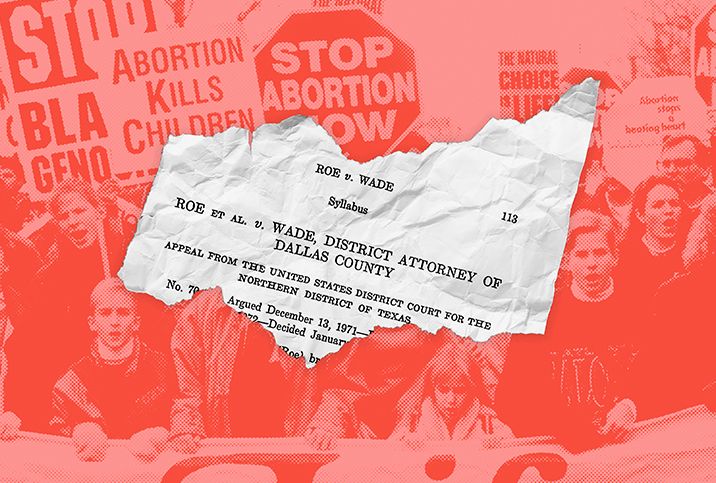The Fall of Roe

The U.S. Supreme Court overturned Roe v. Wade today, June 24, 2022. The court's ruling, split 6-3 along ideological lines, undoes its landmark 1973 decision that a pregnant person's right to an abortion is protected by the 14th Amendment of the Constitution.
The overturning of Roe is incorporated into the decision on the case of Dobbs v. Jackson Women's Health Organization, in which the state of Mississippi asked the high court for the constitutional right to ban some previability abortions if it does not "burden a substantial number of women."
Justice Samuel Alito wrote the majority opinion—it leaked in early May—which argues that the Constitution does not guarantee the right to an abortion.
"The Constitution makes no reference to abortion, and no such right is implicitly protected by any constitutional provision, including the one on which the defenders of Roe and Casey now chiefly rely—the Due Process Clause of the Fourteenth Amendment," Alito wrote.
"Roe was egregiously wrong from the start," he stated.
Justices Breyer, Sotomayor and Kagan file joint dissent
The three liberal justices—Stephen Breyer, Sonia Sotomayor and Elena Kagan—wrote a joint dissent to the ruling.
"Roe held, and Casey reaffirmed, that the Constitution safeguards a woman's right to decide for herself whether to bear a child. Roe held, and Casey reaffirmed, that in the first stages of pregnancy, the government could not make that choice for women. The government could not control a woman's body or the course of a woman's life: It could not determine what the woman's future would be," the justices stated.
"Today, the Court…says that from the very moment of fertilization, a woman has no rights to speak of," they declared.
'With sorrow—for this Court, but more, for the many millions of American women who have today lost a fundamental constitutional protection—we dissent.'
The justices spoke to the uncertainty of how individual states will enforce abortion restrictions: "Whatever the exact scope of the coming laws, one result of today's decision is certain: the curtailment of women's rights, and of their status as free and equal citizens. Yesterday, the Constitution guaranteed that a woman confronted with an unplanned pregnancy could (within reasonable limits) make her own decision about whether to bear a child, with all the life-transforming consequences that act involves…But no longer. As of today, this Court holds, a State can always force a woman to give birth, prohibiting even the earliest abortions. A State can thus transform what, when freely undertaken, is a wonder into what, when forced, may be a nightmare.
"With sorrow—for this Court, but more, for the many millions of American women who have today lost a fundamental constitutional protection—we dissent," the justices concluded.
Chief Justice Roberts files concurring judgment
In the sole concurring judgment, Chief Justice John Roberts said that though he agreed with the judgment, he would have preferred a more measured course.
"I agree with the Court that the viability line established by Roe and Casey should be discarded…That line never made any sense. Our abortion precedents describe the right at issue as a woman's right to choose to terminate her pregnancy. That right should therefore extend far enough to ensure a reasonable opportunity to choose, but need not extend any further—certainly not all the way to viability."
However, Roberts added that he would have stopped there "out of adherence to a simple yet fundamental principle of judicial restraint: If it is not necessary to decide more to dispose of a case, then it is necessary not to decide more. Perhaps we are not always perfect in following that command, and certainly there are cases that warrant an exception. But this is not one of them," he stated.
"The Court's opinion is thoughtful and thorough, but those virtues cannot compensate for the fact that its dramatic and consequential ruling is unnecessary to decide the case before us," Roberts said.
A brief history of abortion rights
Before the 1973 ruling, abortion was completely regulated by the states, and most states prohibited or severely restricted it. These restrictions were challenged by Norma L. McCorvey, of Texas, under the pseudonym Jane Roe, who claimed that the state law criminalizing abortion except when necessary to save the life of the mother violated her constitutional rights.
The lawsuit was filed against Dallas County District Attorney Henry Wade in Texas federal court, which sided with Roe. Wade appealed to the Supreme Court, which also ruled in favor of Roe, 7-2. The ruling made it so states could not outlaw abortion within the first trimester and put restrictions on states' ability to regulate abortions in the second and third trimesters.
'A State can thus transform what, when freely undertaken, is a wonder into what, when forced, may be a nightmare.'
"This right of privacy…is broad enough to encompass a woman's decision whether or not to terminate her pregnancy. The detriment that the State would impose upon the pregnant woman by denying this choice altogether is apparent. Specific and direct harm medically diagnosable even in early pregnancy may be involved. Maternity, or additional offspring, may force upon the woman a distressful life and future. Psychological harm may be imminent. Mental and physical health may be taxed by child care…All these are factors the woman and her responsible physician necessarily will consider in consultation," wrote Justice Harry Blackmun in the Jan. 22, 1973, decision.
However, states have attempted to restrict abortion access ever since Roe, with legislation becoming even more severe in recent years. Six-week abortion bans in Oklahoma and Texas and the 15-week ban in Mississippi are just a few examples.
Additionally, 26 states have laws that will imminently severely limit abortion or restrict it entirely. Some of these are "trigger bans"—laws created after Roe set to take effect immediately when abortion is overturned—while others are pre-Roe legislation still on the books that can now be enforced again after today's Supreme Court ruling.
Physicians take action
Leading medical organizations have made it clear they support Roe. In September 2021, the American College of Obstetricians and Gynecologists and the American Medical Association, along with dozens of additional organizations, filed an amicus brief to the Supreme Court in the case of Dobbs. The brief stated that abortion is safe medical care and a decision that should be made between patient and physician, under the physician's clinical judgment and with the patient's informed consent.
Just days before today's Supreme Court ruling, the AMA further strengthened its long-held position with the adoption of a new policy "recognizing that it is a violation of human rights when government intrudes into medicine and impedes access to safe, evidence-based reproductive health services, including abortion and contraception."
"The new policy also calls for AMA to seek legal protections for patients who cross state lines to receive reproductive health services, as well as legal protections for physicians and others who support or provide reproductive health services or referrals to patients who cross state lines," said Jack Resneck Jr., M.D., the incoming president of the AMA, in the June 14 statement.


















